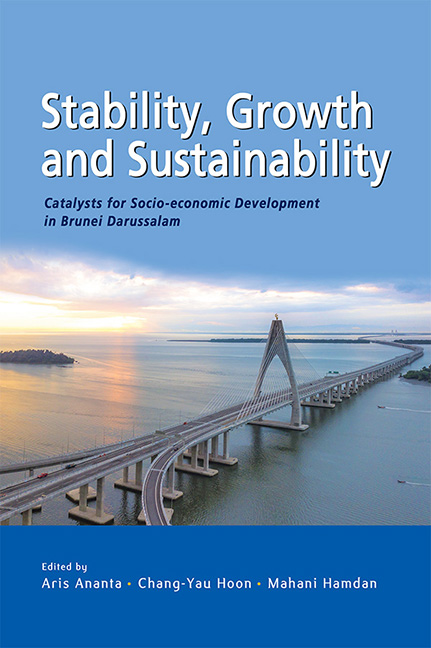1 - An Overview: Diversification in the Oil-dependent Economy of Brunei Darussalam
Published online by Cambridge University Press: 10 January 2024
Summary
WHY DIVERSIFICATION IS NEEDED FOR OIL-DEPENDENT ECONOMIES?
The existence of oil and gas is often seen as a blessing for a country (Fasano 2002; Wright and Czelusta 2004). The revenue from oil and gas can be used to build human capital, including the promotion of entrepreneurship spirit and broadening of the economic base to create sustainable development. However, in most developing countries with abundant natural resources, the paradox of the plenty and resource curse (“Theory of Dutch Disease”) from huge reliance on revenue from oil and gas reserves may also distort the resource allocation of a country (including creation of dominance of public sector employment). It therefore jeopardizes future economic growth and stability of the country (Beblawi 1987; Mahdavy 1970). Based on a study on Saudi Arabia, Aljarallah (2021) concluded that the abundance of oil and gas will produce sustainable economic growth only when the country can utilize the current gain from oil and gas to enhance human capital, which eventually replaces oil and gas as the capital of economic growth.
Furthermore, the price volatility of oil and gas and its recent decline in the past decade, as well as the prospect of depletion of hydrocarbon reserves, and the global trend toward climate-neutral economies may endanger the energy future and sustainability of oil and gas exporting economies. Therefore, oil-dependent economies urgently need to diversify, while efficiently developing themselves using the remaining revenue from oil and gas (Alsharif et al. 2017; Callen et al. 2014; Filimonova et al. 2020; Hussein 2020). The COVID-19 pandemic, which caused a decline in global demand for oil and gas, may have resulted in dual shock (i.e., economic and health crises) in oil-dependent countries. This situation further escalates the need for diversification from oil and gas sectors (Azomahou et al. 2021).
Brunei Darussalam (hereafter, Brunei), the least populous and the second richest country in Southeast Asia, is one of the examples of an oil and gas dependent economy (Asiyah az-Zahra 2017; Hamdan and Hoon 2019). Since independence in 1984, this country’s national income has heavily relied on hydrocarbon resources, although plans for diversification and investment in renewables have been underway for decades.
- Type
- Chapter
- Information
- Stability, Growth and SustainabilityCatalysts for Socio-economic Development in Brunei Darussalam, pp. 3 - 25Publisher: ISEAS–Yusof Ishak InstitutePrint publication year: 2023

